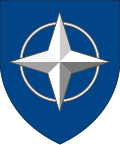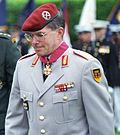| No. | Picture | Chairman of the NATO Military Committee | Took office | Left office | Time in office | Defence branch | Nationality |
|---|
| 1 | | Heusinger, AdolfGeneral
Adolf Heusinger
(1897–1982) | 1 December 1963 | 1 April 1964 | 4 months |  West German Army West German Army |  West Germany West Germany |
| 2 | | de Cumont, Charles PaulLieutenant General
Charles Paul de Cumont
(1902–1990) | 1 April 1964 | 1 June 1968 | 4 years, 61 days |  Belgian Land Component Belgian Land Component |  Belgium Belgium |
| 3 | | Henderson, Nigel Admiral
Sir Nigel Henderson
(1909–1993) | 1 June 1968 | 1 April 1971 | 2 years, 304 days |  Royal Navy Royal Navy |  United Kingdom United Kingdom |
| 4 | | Steinhoff, JohannesGeneral
Johannes Steinhoff
(1913–1994) | 1 April 1971 | 28 June 1974 | 3 years, 88 days |  West German Air Force West German Air Force |  West Germany West Germany |
| 5 | | Hill-Norton, PeterAdmiral of the Fleet
Sir Peter Hill-Norton
(1915–2004) | 28 June 1974 | 20 March 1977 | 2 years, 265 days |  Royal Navy Royal Navy |  United Kingdom United Kingdom |
| 6 | | Zeiner-Gundersen, Herman FredrikGeneral
Herman Fredrik Zeiner-Gundersen
(1915–2002) | 20 March 1977 | 1 January 1980 | 2–3 years |  Norwegian Army Norwegian Army |  Norway Norway |
| 7 | | Falls, Robert Hilborn Admiral
Robert Hilborn Falls
(1924–2009) | 1 January 1980 | 1 November 1983 | 2–3 years |  Canadian Maritime Command Canadian Maritime Command |  Canada Canada |
| 8 | | de Jager, CornelisGeneral
Cor de Jager
(1925–2001) | 1 November 1983 | 30 September 1986 | 2 years, 333 days |  Royal Netherlands Army Royal Netherlands Army |  Netherlands Netherlands |
| 9 | | Altenburg, WolfgangGeneral
Wolfgang Altenburg
(1928–2023) | 30 September 1986 | 5 September 1989 | 2 years, 340 days |  West German Army West German Army |  West Germany West Germany |
| 10 | | Eide, VigleikGeneral
Vigleik Eide
(1933–2011) | 5 September 1989 | 31 December 1992 | 3 years, 117 days |  Norwegian Army Norwegian Army |  Norway Norway |
| 11 | | Vincent, Richard Field Marshal
Sir Richard Vincent
(1931–2018) | 1 January 1993 | 14 February 1996 | 3 years, 45 days |  British Army British Army |  United Kingdom United Kingdom |
| 12 | | Naumann, KlausGeneral
Klaus Naumann
(born 1939) | 14 February 1996 | 6 May 1999 | 3 years, 81 days |  German Army German Army |  Germany Germany |
| 13 | | Venturoni, GuidoAdmiral
Guido Venturoni
(1934–2025) | 6 May 1999 | 30 June 2002 | 3 years, 55 days |  Italian Navy Italian Navy |  Italy Italy |
| 14 | | Kujat, HaraldGeneral
Harald Kujat
(born 1942) | 1 July 2002 | 17 June 2005 | 2 years, 351 days |  German Air Force German Air Force |  Germany Germany |
| 15 | | Henault, Raymond General
Raymond Henault
(born 1949) | 17 June 2005 | 27 June 2008 | 3 years, 10 days |  Canadian Air Command Canadian Air Command |  Canada Canada |
| 16 | | Di Paola, GiampaoloAdmiral
Giampaolo Di Paola
(born 1944) | 27 June 2008 | 18 November 2011 | 3 years, 144 days |  Italian Navy Italian Navy |  Italy Italy |
| – | | Gaskin, Walter E. Lieutenant General
Walter E. Gaskin
(born 1951)
Acting | 18 November 2011 | 2 January 2012 | 45 days |  United States Marine Corps United States Marine Corps |  United States United States |
| 17 | | Bartels, KnudGeneral
Knud Bartels
(born 1952) | 2 January 2012 | 26 June 2015 | 3 years, 175 days |  Royal Danish Army Royal Danish Army |  Denmark Denmark |
| 18 | | Pavel, PetrGeneral
Petr Pavel
(born 1961) | 26 June 2015 | 29 June 2018 | 3 years, 3 days |  Czech Land Forces Czech Land Forces |  Czech Republic Czech Republic |
| 19 | | Peach, Stuart Air Chief Marshal
Sir Stuart Peach
(born 1956) | 29 June 2018 | 25 June 2021 | 2 years, 361 days |  Royal Air Force Royal Air Force |  United Kingdom United Kingdom |
| 20 | | Bauer, Rob Admiral
Rob Bauer
(born 1962) | 25 June 2021 | 17 January 2025 | 3 years, 206 days |  Royal Netherlands Navy Royal Netherlands Navy |  Netherlands Netherlands |
| 21 | | Cavo Dragone, GiuseppeAdmiral
Giuseppe Cavo Dragone
(born 1957) | 17 January 2025 | Incumbent | 290 days |  Italian Navy Italian Navy |  Italy Italy |






























